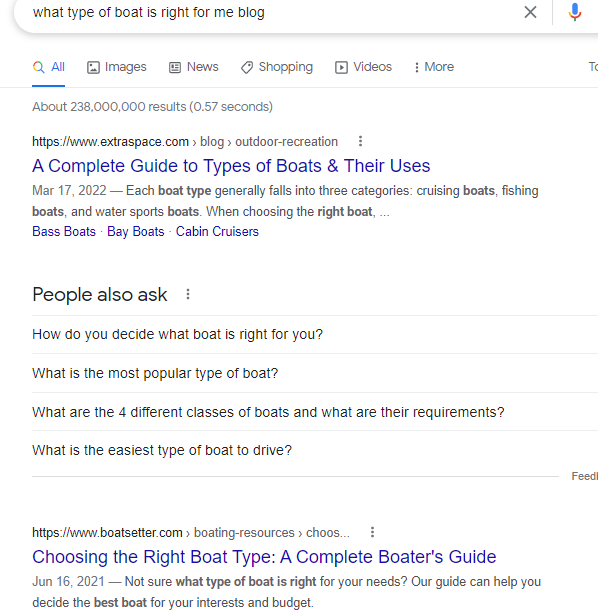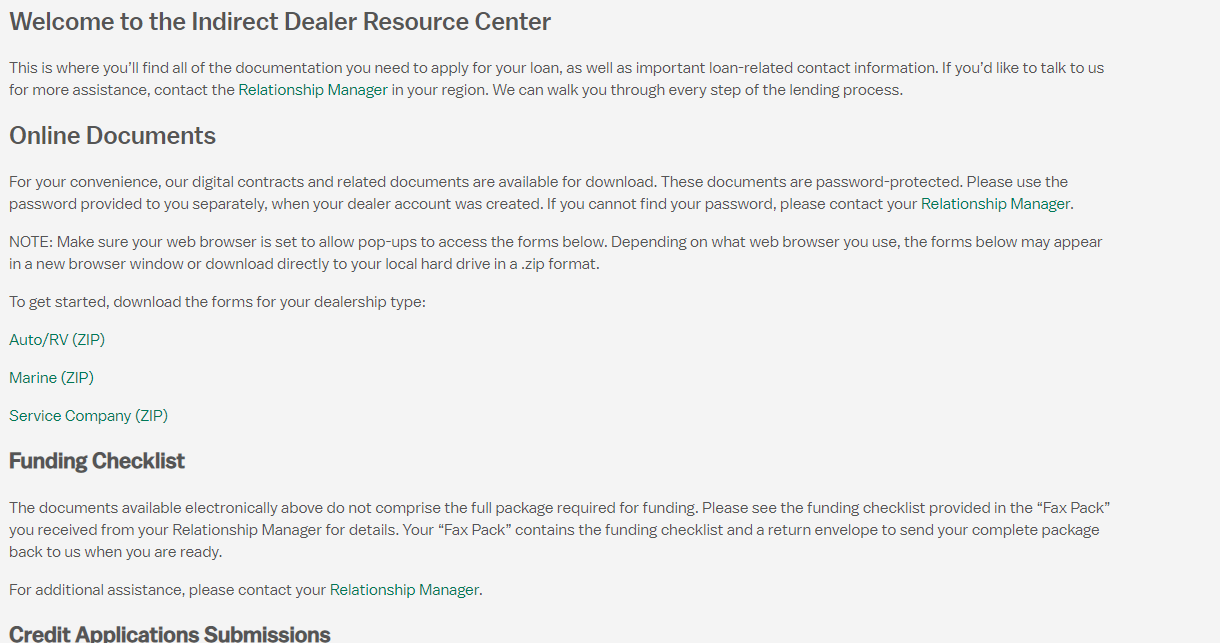Your website should be your best marketing tool. It is the central hub for everything you want your customers to know about your dealership, a tangible business asset with real value, and your virtual business hub. You'll need to leverage the full power of search engines to make your website all that it can be. Let's talk about SEO.
How to get better SEO for your dealership
SEO stands for search engine optimization. Hubspot defines SEO as “techniques that help your website rank higher in organic (or “natural”) search results, thus making your website more visible to people who are looking for your product or service via search engines.”
Basically, you want your website to be the first result when a customer searches “RV dealership near me” on Google or “Where is the best place to buy an RV in [insert location]?” SEO is the process that helps you rank higher than your competitors.
Additionally, you can leverage SEO to gain more traffic for a variety of search terms related to making an RV unit or service purchase. For instance, a blog post titled, "10 Best Places for RV Camping Near [city name] in [year]," could help you drive traffic to your website that you wouldn't get from more direct search terms related to selling units.
Each search engine, whether it's Google, Bing, Yahoo, etc., has its own way of determining where a site should rank on results pages. There are a number of variables search engines consider when they index websites.
What determines good SEO?
According to the Search Engine Journal, in the big picture, there are three concepts a site must master to see a strong return on SEO: Authority, Relevance and Experience.
When ranking websites, search engines will always rank websites that demonstrate authority in that page's topic higher. Authority is earned and not given simply by the name of your page. You can't rely on being an RV dealer to be considered an expert in the field. Primarily, you build authority through links, which we will discuss later.
The relevance concept is fairly simple: You wouldn't come to an RV website to learn about or order pizza. As you produce content for your website, it needs to be relevant to what your website is trying to accomplish. This is especially true with any links on your website you placed for authority purposes. You need to make sure when you link back to another website, that site is active and relevant to the content you are producing. So, if you are showing off a new Forest River IBEX trailer, you can link to a review of that trailer or Forest River's description.
RELATED: How to create a successful YouTube page for your dealership
The experience concept focuses on the experience both a real person and a search engine bot would have on your site. Every visitor to your site has a question on their mind, and they arrive at your page hoping to answer that question.
To give that visitor the best experience, you want to make sure that they can easily find the answer to their question, the page they land on sufficient answers that question, and the page contains links to other pages that may answer similar questions.
The loading time of your web pages also plays a role in SEO as well.
Here are five specific factors that play into SEO rankings and how you can use each of these to optimize your page.
1. Keywords
In the “old days” of search engines, websites would pack as many keywords as possible. The algorithms of today’s search engines are much smarter than that. That doesn’t make keywords useless.
One tip to improve your SEO is to use long-tail keywords. According to Hubspot, a long-tail keyword is "very targeted search phrase that contains 3 or more words." Hubspot says these begin with a generic search term like 'RVs." However, people more serious about a certain topic will have more specific search queries. So instead of simply searching the generic "RVs," they might search the phrase "Class A RVs for sale."
The reasons for employing a strategy around long-tail keywords are:
- Long-tail keywords are typically less competitive for SEO
- They bring in "better quality traffic and higher conversion rates"
- They will help you stay relevant if your business slips in SEO for generic terms
- They help you rank in more difficult search terms
RELATED: Why dealerships should use Google Ads to improve quality of leads
When you produce content for your site, think about exactly what your target audience is searching for on Google. Then implement those keywords into the webpage's title and/or description.
Location is also important when considering keywords. Most people when searching for a product they will buy in person, whether it is a hamburger or an RV, will include it in their search. If you have one location for your dealership, try to include the city and state on your pages. If you have multiple locations, Hubspot recommends, "to create a separate web page dedicated to each location so you can make sure your brand is present when people are searching for individual locations."
RELATED: 5 ways to engage customers on your dealership's social media
When you update your website, make sure to include your location on all your pages. Again, this will help people seriously searching for a place to buy an RV find your dealership first.
One way to identify where you rank is to search for different phrases a customer may use to find an RV dealership. See where your leadership lands in those searches. Then go back to your website and see how you can improve search results on those keywords.
If you are really interested in fully auditing your site's SEO, or you find it hard to come up with ideas for good SEO keywords, there are a few services that can help you.
Two popular options are Semrush and Ubersuggest, both of which will help not only audit your SEO but help you uncover keywords that can improve your site. You will need to pay for these services. However, the potential return in better-qualified leads may be worth the cost if you need SEO help.
2. Images
You may have hundreds of individual pictures on your website that show off your inventory. However, it is important to make sure that each one of those images helps improve SEO.
First, you need to make sure that every picture you upload is giving a non-generic filename. Believe it or not, the original filename for your picture is taken into consideration for SEO. If your picture’s filename is a bunch of random numbers, it will not help you. However, if you name the file “2022-forest-river-cherokee,” search engines will reward you.
RELATED: Optimizing images can do wonders for dealership marketing
Make sure every picture has a description and caption with targeted keywords that people may type in a search engine. You should also add alt text to your pictures or bits of code that attach the picture to a short piece of text. This text appears instead of the image if that image fails to appear.

The way you can add alt text is by going to the settings of the picture, often called "metadata," when you upload it. You should see an editable box next to "Alt text." That is where you would add information about the picture. Keep in mind, long-tail keywords usually produce better long-term results.

You can also add alt text to your images through HTML. After your image source, you would type: alt="Your text."
3. Links
There are three types of links you need to know for SEO: internal, external and inbound links.
Internal links are links you have on your content that go to another specific page on your website. So, if you have a blog and there is a link to your service page, then that is considered an internal link. An external link is a link in your content that goes to another website. For example, if you reference a vendor and you link to the vendor’s website. These links help you build authority on RVs.
The other type of link is inbound. This is when another website links back to yours. This could come from a number of sources including blog posts or news articles. The best way to get inbound links is to make yourself available for other sources to use your knowledge as a dealer in an article.
One way to do this is to form a relationship with at least one of your local news outlets. With this relationship, a reporter may do a story about you or your business. Not only does being on the news give you free advertising, but that story will also end up on their digital platforms. Make sure you tell the reporter to link your dealership in their story, which will give you a free inbound link.
RELATED: Dealership Marketing 101| EverLogic RV Dealership Software
You can also make yourself available to talk to trade magazines and other more targeted outlets, where you may be able to get inbound links to some of your more targeted pages. You may also write blog posts that someone may cite on their website, giving you an inbound link through the citation.
It is important to note that you cannot pay for inbound links. When you pay for a link, it will be given a no-follow tag, which disqualifies that link from SEO consideration. According to Hubspot, if you pay for a link that is not given a no-follow tag, then you can be suspended or blacklisted from search engines.
That doesn’t mean online advertising is bad. However, it will not improve your SEO.
4. Resource Center and Blogging
A resource center is a page on your website that offers education, advice and tips about a business’s product or industry. In the case of RV dealerships, a resource center may include YouTube videos on basic maintenance, an infographic about common problems with an RV or tips for learning how to drive a motorhome.
Going back to our three concepts (authority, relevance and experience), a resource page is a perfect place to fit all three into a central hub. If you can think of a question someone may have, and it is relevant to what you do, the resource page is where they can find content to answer that question.
It is also beneficial to you to create a blog and place it on your site. Like the resource center, the purpose of the blog is to help establish your website query hub. If someone has a question about your dealership or RVs in general, your blog is where you can answer them.
In addition, a blog will increase the size of your website and give you more opportunities to drive search traffic to your website.
Keep in mind that you should not stuff your content with keywords simply for SEO purposes. Search engines pick up shameless keyword plugs and will punish your site for it. Make sure what keywords you do use read organically and is focuses on a certain topic.

5. Title Tags/Meta Tags
The title and meta tags are simply the headline and text that appear as a search result in Google. Putting time into making sure these are optimized for searches can have a big payoff for SEO.
You can find these tags in the metadata settings when you are working on a webpage, whether that be your homepage or a blog post. Having strong titles and tags can be enough to separate you from a potential competitor as you try to climb in Google's rankings.
RELATED: TikTok, short-form video is a growing opportunity for dealerships
For the title of each page, whether it is a landing page or a blog post, make sure you carefully choose what you say. It should have a central phrase that people might search for and should be 75 characters or less. Your long-tail keywords can help you in coming up with a title.
The meta description should max out at about 150 characters. It should be a full, grammatically correct sentence, that describes what content is on the page. Once again, keep in mind that your meta description should not be a place where you place a lot of keywords. Rather, you ought to focus on the purpose of that page and describe it using a key phrase.

Conclusion
RV dealerships' SEO strategy is an almost sure way to capture a larger audience interested in what you have to sell. For any business to be successful in the digital age, a firm understanding of SEO can be the difference between success and failure.
To help build strong SEO, remind yourself that every customer has a question they want to be answered. By taking these steps, you can make sure your customer will not only see your name in the answer, but you'll also see benefits courtesy of Google.
While you are working on the efficiency of your website, you may also want to increase your dealership's overall efficiency. Check out the demo below to see how EverLogic can save you and your team hours of time.
June 22, 2022

